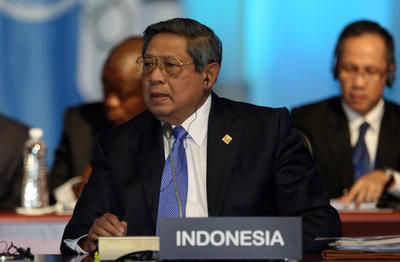Some analysts of Indonesia’s foreign policy are worried that the new president may be inward-looking and more interested in pursuing a nationalistic agenda. This prediction is somewhat overblown. While the new president may be more nationalistic, he or she will be unlikely to radically change Indonesia’s foreign policy direction. There are three reasons for this.
Firstly, as in domestic politics, foreign policy issues involve a broad range of domestic aspirations, from a more protectionist trade policy to human rights and democracy promotion; from a more active stance in ASEAN to one that is more globally-oriented. The new president, like the incumbent, will likely choose the middle ground by continuing Indonesia’s current diplomacy. There will be no extreme policy makeover.
Secondly, Indonesia does not urgently need to pursue an aggressive foreign policy, which requires energy and resources. Indonesia has been criticised for not taking a proactive leadership role in ASEAN during difficult times. For instance, Indonesia did not take a firm stand towards China over the territorial disputes in the South China Sea.
But this position is understandable because adopting an aggressive policy toward China would not only incur economic costs in terms of its relationship with China but would also require a huge effort to rival China’s dominant economic influence in some ASEAN members such as Cambodia and Laos.
Thirdly, the new president will be influenced by a domestic aspiration to see Indonesia play a constructive role in world politics. Indonesians are becoming more mature and rational in responding to international affairs because many of them have international exposure. More government officials from various agencies, including at the regional level, and parliament members have more experience in networking from their involvement in international fora.
The private sector is also lobbying the government for more participation in economic diplomacy. It is true that there has been political tension between Indonesia and its neighbours. Discontent with Malaysia over Indonesian migrant workers led, for example, to protests in front of the Malaysian embassy in Jakarta. Nonetheless, the nationalist rhetoric of a few groups does not necessarily reflect widespread public interest and concern.
The next president will likely try to play a more active and innovative role in global affairs, but without exercising an obsolete ‘Konfrontasi’ spirit. Some presidential candidates have tried to convey to both domestic constituents and foreign observers that they are able to manage foreign relations well.
Jakarta Governor Joko Widodo or ‘Jokowi’, the front-runner for the presidency according to surveys, initiated the first-ever meeting between the governors and mayors of ASEAN’s capital cities a few months ago, a signal that he aims to promote the growth of a Southeast Asian community. Former Trade Minister Gita Wirjawan, who is running for nomination as the Democratic Party’s presidential candidate, has been portrayed as a capable negotiator in difficult meetings of the WTO last December.
Previously, Aburizal Bakrie, the Golkar Party chairman, toured Australia, Malaysia and Thailand to meet leaders of the ruling parties in those countries, apparently to raise his profile as a strong internationalist. Even Prabowo Subianto, who often advocates more protectionist and nationalistic policies, has indicated his support for foreign investment in Indonesia.
While there will likely be no substantial ideological change in Indonesia’s foreign policy under the new leadership after this year’s elections, the next president will need to deal with both regional and global developments which will influence Indonesia’s strategic choices. In Southeast Asia, despite progress towards ASEAN Community 2015, some countries in the region are facing the threat of domestic instability. The political stalemate in Thailand, unresolved protests in Phnom Penh and other internal tensions could weaken enthusiasm for regional integration.
In the broader region, there are tendencies of conservatism and self-serving nationalistic agendas, such as growing tension between China and Japan over territorial disputes, and the controversial ‘stop-the-boats’ policy in Australia.
Amidst an uncertain and unpredictable regional and global situation, Indonesia will strategically try to refocus its foreign policy. It will likely reduce its diplomatic focus on traditional but increasingly less effective organisations such as the Non-Aligned Movement and the Organisation of Islamic Cooperation — two groups in which Indonesia was very active in between the 1960s and 1990s. ASEAN will still be important for Indonesia, but Jakarta may seek to diversify its foreign policy orientation as a consequence of its self-perceived status as an emerging middle power.
For example, together with Mexico, South Korea, Turkey and Australia, Indonesia formed an informal consultative group dubbed MIKTA last year. It is too early to predict whether MIKTA could have significant influence in world politics, especially within the G20, but MIKTA countries have started to meet regularly at the working group level.
As shown by its move on MIKTA, Indonesia in 2014 and beyond will creatively either initiate or join informal groupings, a new phenomenon in world politics. For any future Indonesian president, joining the club of middle and emerging powers across different regions will not be entirely aimed at influencing global governance. More importantly, it will have a domestic goal. If the new leader intensifies efforts to raise Indonesia’s image as an emerging power, he or she will be regarded by constituents at home as a competent leader of this big and complex nation.
Awidya Santikajaya is a PhD candidate at the Asia-Pacific College of Diplomacy, The Australian National University. A version of this article was originally published here as RSIS Commentary No. 46/2014.

